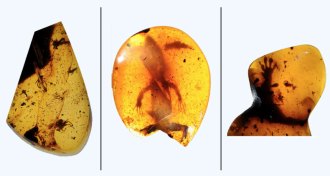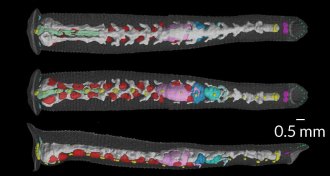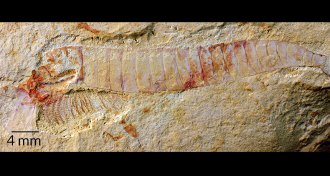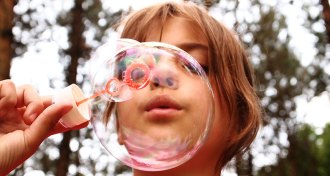Uncategorized
-
 Paleontology
PaleontologyLizards locked in amber provide clues to reptile evolution
Amber-encased lizard remains that date to 99 million years ago may shed light on the evolution of geckos and chameleons.
-
 Health & Medicine
Health & MedicineMicrocephaly: Building a case against Zika
Zika virus is the prime suspect for Brazil’s recent surge in birth defects. New evidence in human cells strengthens the case, but more definitive proof could come this summer from Colombia, where thousands of pregnant women have been infected.
By Meghan Rosen -
 Animals
AnimalsIs Amy Tan actually ‘thrilled’ a leech is named after her?
Novelist Amy Tan answers a lingering question about celebrities honored in scientific names of new species — her namesake is a leech.
By Susan Milius -
 Genetics
GeneticsMissing genes not always a problem for people
Humans have ways to make up for missing genes, study suggests.
-
 Psychology
PsychologyPsychology’s replication crisis sparks new debate
Controversy flares again about whether psychology studies survive further scrutiny.
By Bruce Bower -
 Astronomy
AstronomyA fast radio burst’s home galaxy may not be known after all
The recently claimed host galaxy of a fast radio burst may have been signs of a snacking black hole instead, study claims.
-
 Astronomy
AstronomyRepeating fast radio bursts recorded for the first time
Until now, ephemeral blasts of radio waves from other galaxies have never repeated; this one erupted 10 times last year.
-
 Paleontology
PaleontologyFossil reveals an ancient arthropod’s nervous system
A roughly 520-million-year-old fossil preserved an ancient arthropod’s ventral nerve cord and peripheral nerves.
-
 Oceans
OceansMagnetism from underwater power cables doesn’t deter sea life
High-voltage power cables that ferry electricity across the seafloor do not negatively impact local fish and crabs, new studies show.
-
 Health & Medicine
Health & MedicineScientists probe Zika’s link to neurological disorder
The link between the Zika virus and Guillain-Barré syndrome is growing stronger.
By Laura Sanders and Meghan Rosen -
 Physics
PhysicsBubble blowing gets scientific scrutiny
A new study uncovers the basic physics of blowing soap bubbles.
-
 Oceans
Oceans3.5 billion years ago, oceans were cool, not hot
Extensive new evidence from South Africa suggests that 3.5 billion years ago, Earth was locked in a cold spell, with isolated blasts of hydrothermal heat that may have helped incubate life.
By Beth Geiger